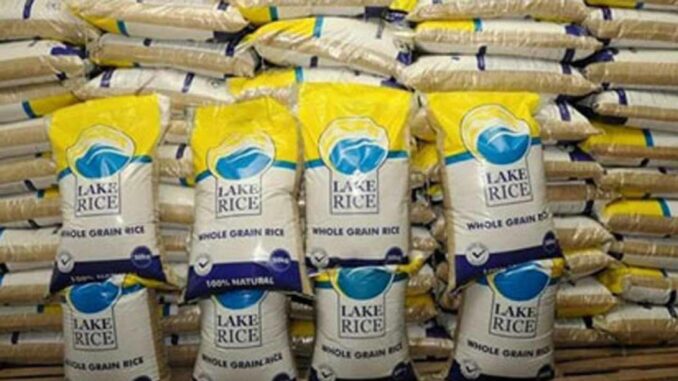
Barely four years after the launch of the Lagos-Kebbi Rice christened LAKE Rice, an initiative borne out of the collaboration between Lagos and Kebbi State Governments, the rice has gone out of circulation.
During the launch, held at the Lagos House, Ikeja, Lagos on December 21, 2016, the former Lagos State Governor, Mr. Akinwunmi Ambode and his Kebbi State counterpart, Alhaji Atiku Bagudu, said the partnership which culminated in the launch was not only designed to ensure food security but to showcase the ability of Nigeria to become a rice-producing nation.
Ambode said the development was a great and historic moment for both states and Nigeria, as the rice would not only be sold at a highly reduced price, compared to what obtains in the market, but it’s also very fresh and safe for consumption.
The Guardian investigations showed that the three years seamless record of providing the rice for Lagosians have been broken as the brand has now disappeared from circulation.
The absence is so conspicuous at this period when the price of both the local and foreign rice is going beyond the reach of the masses, considering the fact that it is cheap, affordable, and in smaller bags.
Since the period of the lockdown occasioned by the coronavirus pandemic, the foreign brand has been the saving grace for most Lagosians, despite the high price, as the much-hyped Lagos-branded rice disappeared from the markets.
As of Thursday, a 50kg bag of rice (imported) was sold for N28, 000; 25kg-N14, 500 and 10kg-N12, 000, while 50kg of local rice has risen to N25, 000 across markets in Lagos and other parts of the country.
For the few festive seasons after the launch, the brand endeared the heart of many, even beyond Lagos, as the state recorded huge sales, which made a huge statement that the brand has come to stay.
One of the reasons the brand was much sought-after was the fact that it is fresh and wholesome on one hand, and affordable as it sells for N12, 000, N6, 000 and N2, 500 for 50kg, 25kg and 10kg, in that order, a price tag it maintained for two years, contrary to the price of foreign brands.
But in December 2018, the rice went off-market, as it was no longer available at sales points and markets. This development came after the government signed a Memorandum Of Understanding (MoU) for mass distribution and sales. The issue was left unaddressed till May 29 last when Ambode left office.
But as the 2019 Eid-eI-Kabir was approaching, the rice staged a return, but with over 15 per cent price increase. The price of a 50Kg bag increased from N12, 000 to N14, 000, 25kg bag increased to N7, 000 from N6, 000, while 10kg sold for N3, 500 instead of N2, 500.
But since the mopping of the entire stock for the festive season, which was over a year ago, the rice has a completely gone-off market.
Several entreaties made to know the cause of the disappearance have yielded no fruit, as government officials were not forthcoming on the issue.
There were, however, unconfirmed reports that the initiative might be going the way of other failed programmes of the government in the country. One of the points raised was the fact that the collaboration was initiated by the Ambode’s administration and might have been terminated by the current Governor, Babajide Sanwo-Olu.
But the Kebbi State Governor, Bagudu, who informed The Guardian that nothing has gone wrong with the MoU, said the Lake rice has not disappeared, “it’s just that we haven’t grown it to replace the market. When we entered into a partnership with Lagos, we did not intend the two states to be selling rice, we did it to demonstrate that Nigerians produce good rice. To provide a platform where people would move it to the highest standard so Nigerians would recognise the potential we have and have a great mindset about made in Nigeria rice.”
He said the objective has been achieved, “now across the nation, there is belief and confidence in Nigerian rice, whether it is from Abakaliki, Ogoni, Kebbi, Jigawa, Taraba, and across the country. That’s our first objective in that MoU.
“But it hasn’t disappeared; it’s just that we haven’t grown it to replace the market. But there is a mill that has been constructed at Imota, courtesy of the Lake rice partnership, that is supposed to continue to support belief in the “Nigeria Can Do It Project,” because essentially, that is what the partnership is all about.”
When contacted, the Public Relations Officer (PRO), Lagos Ministry of Agriculture, Jide Lawal, whose point also complements Bagudu’s position, told The Guardian that the disappearance of the rice is due to the fact that the state’s rice mill located at Imota, Ikorodu will be coming alive by the end of the year, added that that is the reason why the state is focusing efforts on its completion. “The mill will be launched by the grace of God on or before the end of the year. The Lake rice coming from Kebbi is based on the partnership, now we have a mill-the flagship 32 metric tonnes per hour rice mill, adjudged the largest in Africa. So, with that, the production of the rice will be done and Lake rice will come back to the market.”
END

Be the first to comment